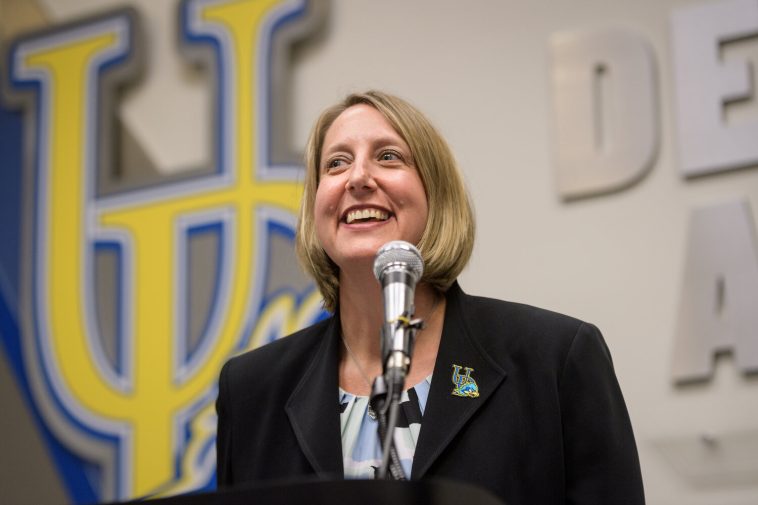On the 2nd of December, a meeting was held by the Faculty Senate, overseen by the Senate President, Vickie Fedele. According to Fedele, the senate representatives have taken part in six of the Trustee Committee meetings over the course of November. Throughout the assembly, they’ve acted primarily as observers, focusing on absorbing the various topics discussed. The senate has been urged by Chair Terri Kelly to adopt a more hands-on role, and to take questions from the committee meetings for further deliberations.
Vickie Fedele conveyed her intention to circulate summaries of the committee meetings amongst the Faculty Senate members. She also welcomed comments or queries from the senators as a follow-up to this plan. A part of the Faculty Senate meeting was dedicated to Chrissi Rawak, the Athletics Director, who gave an informative talk concerning the University of Delaware’s athletics program. She touched on subjects such as the academic achievements of the program’s student-athletes, its support for UD’s academic mission, and the economic effect it has in the state of Delaware.
Rawak was invited to the Senate meeting by Fedele in order to answer any impending questions regarding the financial aspects of UD’s athletics program. The Athletics department at UD sponsors 21 varsity sports, which is set to become 22 with the inclusion of women’s ice hockey next summer. The Athletics department also looks after the administration of campus recreation programs, including intramural sports and well-being activities. In addition, it manages community-serving facilities, such as swimming pools and ice rinks.
Chrissi Rawak shared that UD athletics garners engagement from over one million people annually, a statistic which translates to a significant economic impact. She informed,”Whenever we host a football game on campus, the community sees an expenditure exceeding $1 million just within that weekend.” She went on to discuss the department’s revenue model, which is composed of institutional backing, self-generated income, and student fees.
The Athletics department has been focusing on boosting self-generated revenues from diverse sources like ticket sales, facility rents, philanthropy, and sponsorships. Simultaneously, the department has slowly hiked up student fees in an attempt to lessen the dependency on institutional support. Sharing some highlights, Rawak said, “In the last five years, we succeeded in cutting down our institutional support by 24%, whereas our self-generated revenue saw an increase by 58%.
Our philanthropic efforts managed to cover the $5 million fee required for the Football Bowl Subdivision (FBS) reclassification, enabling UD to become a part of Conference USA in 2025. Interestingly, the fee was a mere $5,000 when UD first began contemplating a conference move.” Rawak expressed a firm belief in the long-term benefits this step holds for the university and the state of Delaware.
With the added advantage of being part of Conference USA comes global recognition – facilitated by the broadcasting of sporting events on platforms like ESPN, and enhanced revenue from fans traveling to Delaware for games. Moreover, UD’s potential to broaden its student enrollment market remains untapped. Chrissi Rawak assured that the decision of joining Conference USA would not have a detrimental effect on the students’ academic experiences owing to game travels. On the contrary, she believes that increased travel costs would be counterbalanced by the projected growth in revenue from media rights, sponsorships, and ticket sales.
Rawak explained, “From the academic perspective, we already have effective management of travel schedules. We certainly feel that missing classes is far from ideal. We greatly value our faculty members’ efforts in cooperating with our student-athletes to work around this issue.” She went on to proudly highlight that the previous academic year saw over 600 student-athletes securing an average GPA of 3.3, the highest the department has ever achieved.
The department takes immense pride in the exceptional performance of the student athletes. In the previous year, 418 students had the distinction of making the Dean’s list. Boasting a staggering 95% graduation rate, Chrissi Rawak reflected on the impressive number of student-athlete graduates that the department produced. Stunningly, within just six months post-graduation, 96% of these graduates had either secured employment or enrolled in graduate studies.
Rawak stated that the athletic department is firmly committed to supporting UD’s academic mission. One way it accomplishes this is by ensuring that all physical facilities are open to student use for academic tasks such as research, internships, and capstone projects. Cooperating with faculty members, the department also aims to provide students with a broad range of experiential learning opportunities.
In other campus-related matters, the Faculty Senate voted unanimously (71-0) to replace gender-specific pronouns with gender-neutral ones in the faculty handbook. The Senate seems to be making clear strides towards promoting inclusivity and emphasizing respect for individual identities across the faculty and student body.
The meeting’s consent agenda comprised eight items in total – among which were six proposals for professional and continuing education certificates and two proposals from the Communication Department concerning the introduction of a new theory course into its master’s and doctorate programs.
The proposals put forth in the consent agenda provoked no discussions, seemingly indicating unanimous consensus among the senate members. The proposals were subsequently confirmed with a vote count of 73 in favor and none against.
This demonstrates the Faculty Senate’s commitment to continuous academic improvement, expanding learning opportunities for students, and supporting the growth of the various departments and programs within the University of Delaware.
In conclusion, the Faculty Senate meeting proved to be an efficient platform for sharing ideas, discussing university growth plans, and finalizing administrative decisions. The active participation and engagement of all representatives contributed to the successful recognition of new initiatives and the resolution of pending issues.
Moving forward, the Faculty Senate and the athletic department plan to maintain their commitment to facilitating academic success alongside athletic performance. The goal is to create a balanced environment where students can excel both in their academic pursuits and in their collegiate sports careers.


